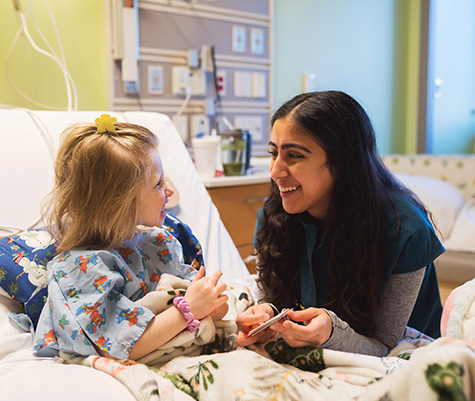In collaboration with Emory University School of Medicine, our experienced team in the Hemostasis and Thrombosis Program at the Aflac Cancer and Blood Disorders Center of Children’s Healthcare of Atlanta offers a full range of services to diagnose and treat children with bleeding and clotting disorders, including hemophilia, thrombosis and von Willebrand disease.
What is hemostasis?
Hemostasis is the process that stops bleeding. There are many different types of genetic (present at birth) bleeding disorders, including:
- Hemophilia A
- Hemophilia B
- Von Willebrand disease
- Other rare factor deficiencies
- Platelet function disorders
A child with a bleeding disorder may have to cope with many different complications throughout his life, including:
- Unusual bleeds: Children who have a bleeding disorder may bleed longer or more than most people. These bleeds can happen outside the body or within the joints or muscles.
- Joint damage: Bleeding in the joints or muscles causes pain, swelling and difficulty walking or moving.
- Inhibitors: Some children develop inhibitors that can make treatment more difficult. Inhibitors happen when a child’s immune system fights off the medication used to treat the bleeding disorder.
What is thrombosis?
Thrombosis is blood clotting within a blood vessel. For most people, this process is healthy and normal. For children with a clotting disorder, a blood clot partly or fully blocks blood flow, which can lead to serious complications. If the clot moves to an important part of the body, such as the brain or lungs, it can be deadly.
Blood clotting disorders include:
- Arterial thrombosis
- Stroke
- Thrombophilia
- Venous thrombosis
The Aflac Cancer and Blood Disorders Center is home to the largest pediatric hematology program in the country. The size of our program and the breadth of our expertise allow us to offer the highest degree of specialization, which means that every child is cared for by a team that is focused solely on his or her specific childhood blood disorder.
Our Hemostasis and Thrombosis Program offers a full range of treatment options for children with bleeding and clotting disorders. We will create a treatment plan just for your child, as treatment approaches can vary. Our team works closely with each family to determine the best course of action. Combining the latest proven technology and research with a caring, child-friendly approach makes the Aflac Cancer and Blood Disorders Center a top choice for the treatment of both common and rare blood disorders.
Program highlights include:
- In collaboration with Emory University, we follow more than 1,000 children and adults with bleeding disorders and approximately 200 with clotting disorders in our comprehensive Hemostasis and Thrombosis Program.
- We are a recognized leader among treatment facilities in the U.S. for achievements in care, education and research for patients with congenital bleeding disorders.
- We developed a successful, integrated pediatric- and adult-care model that reduces the stress and barriers associated with transitions from a pediatric- to an adult-care facility for patients with bleeding disorders.
- We participate in innovative clinical, epidemiological, translational and basic science research designed to provide leading-edge therapies and eventual cures.
The Aflac Cancer and Blood Disorders Center is committed to excellence and innovation in pediatric research. As Georgia’s top pediatric cancer and blood disorders research center, we are home to one of the largest clinical trial programs in the country, offering our patients access to some of the most novel childhood cancer and blood disorder treatments available.
View our open research studies:
Receiving a blood disorder diagnosis for your child can be an emotional and overwhelming experience. The Aflac Cancer and Blood Disorders Center is here to support you and your family while your child is in our care because family is a big part of your child’s well-being. Not only are you a vital member of your child’s healthcare team; you are a source of security and comfort.

We work to support your whole family while your child is in our care—and after she goes home.
Clinical faculty:
- Prashant Raghavendran, DO
- Michael White, MD
- Gary Woods, MD, Medical Director of Hematology
- Karen Zimowski, MD
Research-intensive faculty:
- Robert Sidonio Jr., MD, MSc, Clinical Director
- Wei Deng, PhD
- Renhao Li, PhD
- John (Pete) Lollar III, MD
- Shannon Meeks, MD
- Yingchun Wang, MD, PhD
Advanced practice providers:
Contact Us 404-785-1112